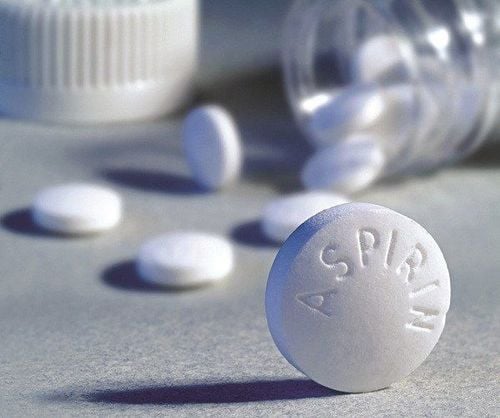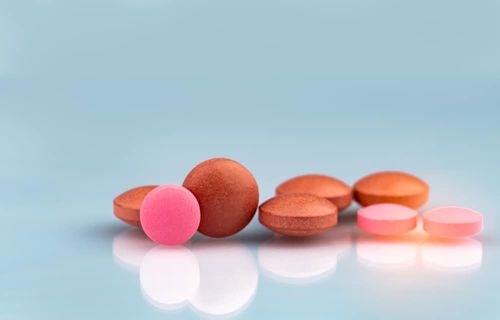This is an automatically translated article.
Nicardipine has the main active ingredient Nicardipine and other excipients in a sufficient amount. This medication is used to treat high blood pressure. Nicardipine is also used to prevent certain conditions of angina.
1. What is Nicardipine?
The name of the main active ingredient is Nicardipine;
Drug class: Calcium channel blocker derivative of 1,4 dihydropyridine.
Dosage form and strength
Capsules content 20 mg, 30 mg; Long-acting capsules 30 mg, 40 mg, 45 mg, 60 mg; Nicardipine hydrochloride 20mg tablets. Injection: 2.5 mg/ml nicardipine hydrochloride. Nicardipine is used alone or in combination with other drugs to treat high blood pressure. It is also used to prevent certain angina conditions. The drug may be useful in increasing athletic performance and reducing the frequency of angina attacks.
2. What disease does Nicardipine treat?
Nicardipine is indicated in the following cases:
Treatment of stable angina: The active ingredient Nicardipine used orally can be indicated in the treatment of angina, alone or in combination. . Treatment of mild to moderate hypertension: Nicardipine can be used alone or in combination with other drugs in the treatment of mild to moderate hypertension. Especially for those at high risk of cardiovascular events or those with comorbid diabetes. Treatment of hypertensive crisis: Intravenous nicardipine is indicated in the treatment of hypertensive crisis (hypertensive emergency and hypertensive emergency). The effect of the drug is to prevent progressive target organ damage such as hypertensive encephalopathy, unstable angina, acute pulmonary edema, myocardial infarction, stroke or intracranial bleeding, eclampsia. Note that when using intravenous nicardipine, blood pressure should only be lowered to a safe level and closely monitored, not necessarily to bring blood pressure to normal quickly.
3. Nicardipine drug interactions
3.1. Interactions of Nicardipine with Other Drugs Beta Blockers: Nicardipine may enhance the inotropic effects of beta-blockers and may cause heart failure in people with a history or uncontrolled heart failure. . Dantrolen: The combination of a calcium channel blocker such as nicardipine and dantrolene is potentially dangerous. Magnesium Sulfate: Because of the possible risk of pulmonary edema or an excessive decrease in blood pressure, caution should be exercised if nicardipine with magnesium sulfate is used concurrently. Induction and inhibition of CYP3A4 enzymes: Nicardipine is metabolised by Cytochrome P450 3A4. CYP3A4 enzyme inducers (eg, carbamazepine, phenobarbital, phenytoin, fosphenytoin, primidone and rifampicin) may decrease nicardipine plasma concentrations. Drugs that inhibit the enzyme CYP3A4 (eg, cimetidine, itraconazole and grapefruit juice) may increase plasma concentrations of nicardipine. Combination therapy with calcium channel blockers specifically nicardipine with itraconazole has been shown to increase the risk of adverse reactions. Specifically, this combination may induce edema caused by a decreased metabolism of calcium channel blockers in the liver. Concomitant treatment with nicardipine and ciclosporin, tacrolimus or sirolimus resulted in increased plasma concentrations of cyclosporin/tacrolimus. Blood levels of the active substance should be monitored and the dose of the immunosuppressant and/or nicardipine should be reduced, if necessary. Digoxin: In pharmacokinetic studies, nicardipine was reported to increase plasma concentrations of digoxin. The use of Digoxin should be monitored during concomitant treatment with nicardipine. Enhanced Antihypertensive Resistance: Drug combinations that may have antihypertensive activity with nicardipine include: alpha sympathomimetic, tricyclic antidepressants, baclofen, sedatives, narcotic analgesics and amifostine. Decreased Antihypertensive: Decreased antihypertensive effect when nicardipine is used in combination with corticosteroids and tetracosactide intravenously (except when hydrocortisone is used as replacement therapy in Addison's disease). Inhaled drugs: Co-administration of nicardipine with inhaled drugs may enhance or synergize the antihypertensive effect. Nerve Blockers: Data suggest that nicardipine, and other calcium channel blockers, potentiate neuromuscular blockade by acting on the pharyngeal region. 3.2. Interaction of Nicardipine with food Concentration and toxicity of Nicardipine increases when taken with grapefruit juice, avoid using together during treatment.
4. Some notes when using Nicardipine
4.1. Contraindications of the drug Nicardipine Nicardipine is contraindicated in the following cases:
There is a history of hypersensitivity to the active ingredient Nicardipine; Cardiac shock; Have aortic valve stenosis; Cardiogenic shock, unstable angina, clinically significant aortic stenosis, within one month of myocardial infarction; The drug should not be used for acute angina attacks; Should not be used for secondary prevention of myocardial infarction; Women who are pregnant and breastfeeding. 4.2. General note when using Nicardipine drug Nicardipine must be used with caution, especially with intravenous administration in the following cases:
People with cerebral infarction or cerebral hemorrhage due to acute drop in blood pressure or arrhythmia fast. People with kidney failure, liver failure. An increase in the frequency, duration and severity of angina attacks in individuals may be expected when nicardipine therapy is initiated or the dose is titrated up. Congestive heart failure, especially in people taking beta-blockers concurrently. 4.3. Note for pregnant and lactating women Note to pregnant women: Currently, there is not enough information and good control on the use of Nicardipine in pregnant women. The drug crosses the placenta. When you are pregnant, you should only use Nicardipine when it is absolutely necessary because it can be dangerous to the fetus. Note to nursing women: Nicardipine was excreted in high concentrations in milk in laboratory rats. The reason is that the drug has the potential to cause serious adverse reactions in nursing infants, so during breastfeeding mothers are advised not to be treated with the drug. Attention when driving and operating machinery: Care should be taken when using Nicardipine because its blood pressure lowering effect can cause dizziness. Above is important information about Nicardipine, knowing the information, uses, and dosage helps the process of using the drug more effectively and safely for patients.
Please dial HOTLINE for more information or register for an appointment HERE. Download MyVinmec app to make appointments faster and to manage your bookings easily.













